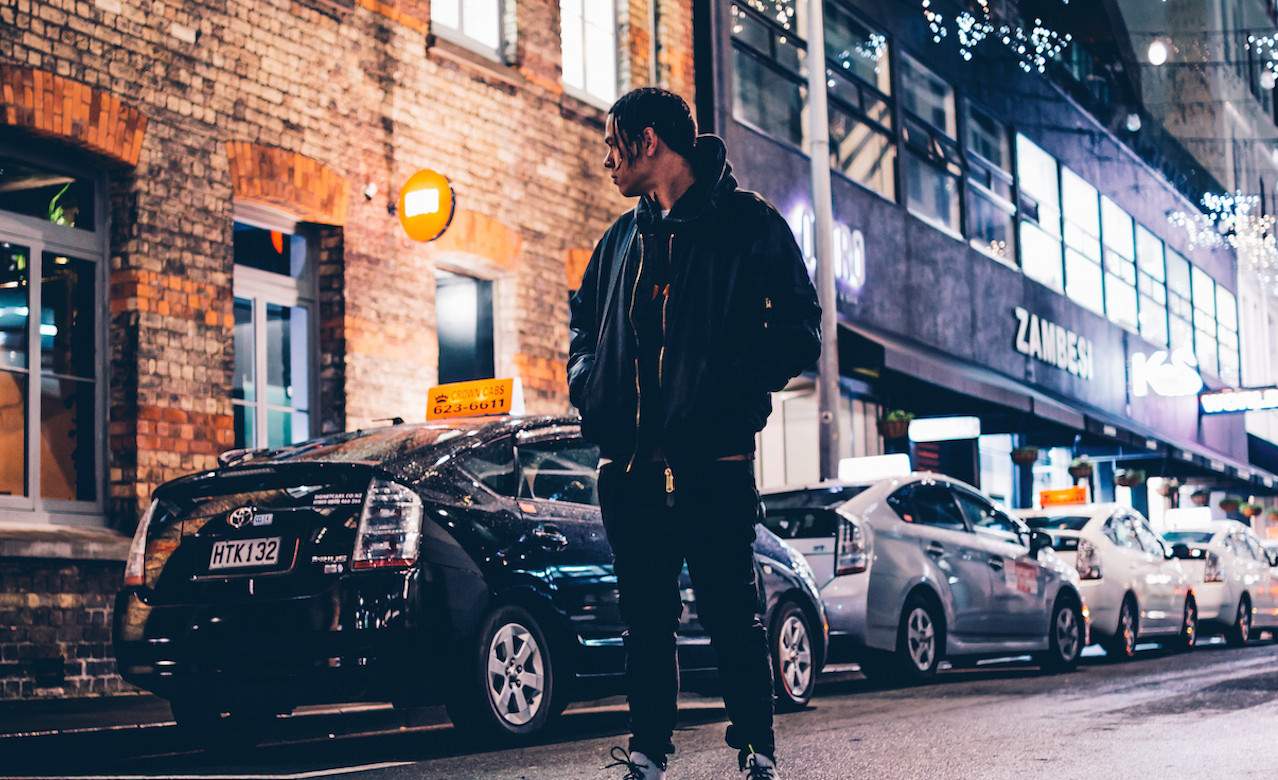Concrete Playground Meets Diaz Grimm
Off the back of releasing his second album, 2077, we talk the importance of community, Trump, and living in the future with the eternally optimistic Cambridge rapper.
Diaz Grimm hit the local hip hop scene in 2015 with his debut album, Osiris, earning the artist a nod at that year's New Zealand Music Awards in the 'Best Urban' category, and cementing him as a musical and lyrical force to be reckoned with.
Now with his second album, 2077, out on Spotify and a recently released music video under his belt, it seems that the only way is up (way, way up into the mesosphere) for this Cambridge local and his unique talent for musical storytelling. We sat down with him over a coffee to chat about his creative vision.![]()
Dubbing himself an "eternally optimistic person", Grimm's vision of hip hop as a genre on the forefront of social and cultural change has helped forge his ethos of giving back. In his recently released video for 'Since 7' he features children from his old primary school in Cambridge (Leamington Primary) dressed up as various versions of what they want to be when they grow up. The song talks about the possibilities of being any number of things.
When asked about the inspiration behind the video, Grimm cited an old McDonald's advertisement with a jingle that had reminded him to wear his seatbelt to this day, saying, "I'd love to give back to my primary school and be that person that the kids remember [as giving them advice and encouragement]". It's his selflessness and big picture attitude that makes his music so appealing and free of any apparent ego. He has a clear vision as an artist and wants to reach those who wouldn't ordinarily be counted among his target listening audience, aiming at a middle ground, where you don't have to be a fan of rap to be a part of his community, you just need to listen to the message.
We briefly touched on the recently uprooted American political landscape, as Grimm noted that, for all the pitfalls of a Trump presidency, at least it might force people to "get off their asses and do something" which in many ways is how he sees his role with his art. I wondered when listening to 2077 and on its being set in the future, whether he was expressing disillusionment with the current state of the world. But after Grimm's self-description as a "live in the future person", and his infallible optimism, I understand his music as more of an expression of hope for the future.
Interestingly, especially for an artist so new to the scene, Grimm has a grand plan in motion involving four albums, all written with the same story in mind— a screenplay for a short film he has written, but lamented he didn't have the resources to produce in film form yet. Rather, the idea of a single storyline and theme has been twisted into four albums that he hopes will eventually act as a cohesive soundtrack to his realistic sci-fi short. Grimm's vision to art and creativity takes in many creative platforms, meaning that it's hard to put his work or his talent into any kind of box (and he wouldn't have it any other way).
As we talked about the progression from his debut album Osiris, he discussed honestly how his decision to return to Cambridge to make the second album in a home studio (called the 'Magic Box') allowed for greater creative freedom. He also spoke to the loneliness he felt through the production process, something he saw as necessary to the message of the album, saying the lack of featured artists on 2077 was in the spirit of remaining true to the underlying story— which follows a guy alone in a spaceship lost in space.
That element of loneliness is audible in the dark, post-apocalyptic undertones of 2077's musical aesthetic- a dense sound broken up by twinkling synths and crisp drums, conjuring images for me of stars breaking through a night sky. In his song 'Foreigner', Grimm raps about feeling like a kind of alien saying, "we are all foreigners", which, he admitted, reflected his feeling at times out of place in New Zealand. He laughed and said, "American hip hop was my biggest father figure" and yet "since travelling the States I appreciate being from somewhere like Cambridge a lot more. I stargaze most nights". He exists and thrives artistically in different ways in both places, but they equally add to his persona and artistic aesthetic. His universal appeal beyond New Zealand and his planned move to Canada next year bodes promisingly for his future on the international stage.
Along with his music, Grimm talked about starting his own online store selling antiques and rare one-off pieces as well as facilitating one-of-a-kind collaborations with artists and other creatives. He also talked about recent research into Maori history for his third studio album, and spoke on the importance of teaching te reo Maori to children early in their education saying, "they haven't been molded yet to stick to certain beliefs". He referred to interacting with the kids from the 'Since 7' video as having changed his life. His social conscience and cultural interests run deep. It enriches his music.
But what struck me most about Diaz Grimm was his courage as a creative to explore the bounds of his talent in more than one field. As he explained, "I want to get to a place where I can comfortably freelance creatively and music is just one of the things I do." He showed me the ring he designed baring the words by which he lives: 'imagine, create, share'. His dedication, interest in others and the community, and original ideas set him apart and above and if that Grammy stays on his goals list, I'm sure it will only be the beginning.





